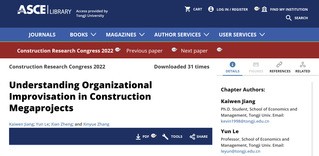摘要
Organizational improvisation (OI) is a spontaneous process deviated from plans and routine, which is carried out by actors to deal with emerging issues or unexpected events. Megaprojects are confronted with complex and dynamic uncertain circumstances, leading to the requirement of distinct OI conducted by multi-level stakeholders. However, current research primarily focused on OI at the individual level in ordinary projects neglecting the multi-level and degree characteristics of OI in megaprojects. To systematically understand OI in megaprojects (MOI), this study introduced classic OI theory to megaprojects by constructing a three-dimension MOI framework, involving improvisation degree, organizational level, and project stage. An inductive approach was utilized via expert interviews and 424-event collection to consolidate the framework. The result demonstrated that MOI most frequently occurs at the construction stage, during which minor improvisation at the team level is the most common, followed by minor improvisation at the individual level, and bounded improvisation at the team level. This research extended OI theory into the construction megaprojects field by providing stakeholders with a further understanding of MOI to deal with various uncertainties.





